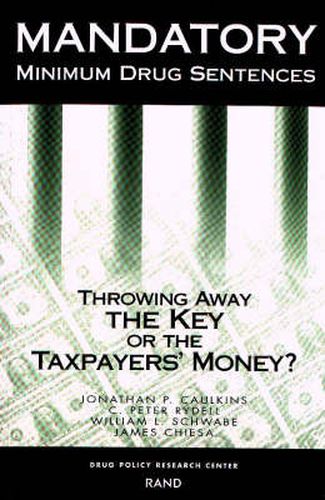Readings Newsletter
Become a Readings Member to make your shopping experience even easier.
Sign in or sign up for free!
You’re not far away from qualifying for FREE standard shipping within Australia
You’ve qualified for FREE standard shipping within Australia
The cart is loading…






Laws requiring minimum sentences for certain crimes have become increasingly popular, and the most frequently applied of these mandatory minimums are those pertaining to drug offenders. Proponents and opponents of mandatory minimums generally argue over issues of punishment, deterrence, justice, and fairness. The authors of the current study examine mandatory minimum drug sentences from the viewpoint of cost-effectiveness at achieving such national drug control objectives as reducing cocaine consumption and cocaine-related crime. They conduct their analysis with the help of mathematical models estimating the response of cocaine supply and demand to changes in levels of enforcement and treatment. The authors find that a million dollars spent extending sentences to mandatory minimum lengths would reduce cocaine consumption less than would a million dollars spent on the pre-mandatory-minimum mix of arrests, prosecution, and sentencing. Neither would reduce cocaine consumption or cocaine-related crime as much as spending a million dollars treating heavy users. These conclusions are robust to changes in various assumptions underlying the analysis.
$9.00 standard shipping within Australia
FREE standard shipping within Australia for orders over $100.00
Express & International shipping calculated at checkout
Laws requiring minimum sentences for certain crimes have become increasingly popular, and the most frequently applied of these mandatory minimums are those pertaining to drug offenders. Proponents and opponents of mandatory minimums generally argue over issues of punishment, deterrence, justice, and fairness. The authors of the current study examine mandatory minimum drug sentences from the viewpoint of cost-effectiveness at achieving such national drug control objectives as reducing cocaine consumption and cocaine-related crime. They conduct their analysis with the help of mathematical models estimating the response of cocaine supply and demand to changes in levels of enforcement and treatment. The authors find that a million dollars spent extending sentences to mandatory minimum lengths would reduce cocaine consumption less than would a million dollars spent on the pre-mandatory-minimum mix of arrests, prosecution, and sentencing. Neither would reduce cocaine consumption or cocaine-related crime as much as spending a million dollars treating heavy users. These conclusions are robust to changes in various assumptions underlying the analysis.